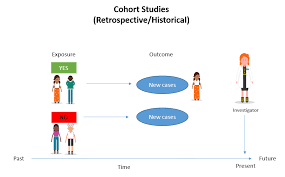What is a Cohort Study?
A cohort study is a type of epidemiological study that is commonly used to investigate the causes of a particular disease, condition, or health-related outcome. In a cohort study, a group of individuals (the cohort) is observed over time to assess their exposure to specific risk factors and to determine if the exposure is associated with the development of a particular health outcome. Cohort studies are valuable for studying the natural history of diseases, identifying risk factors, and determining causality.


Selected Cohort Study
The following link directs you to a research paper conducted by J. Mackenbach and H. van de Mheen, titled "A prospective cohort study investigating the explanation of socio-economic inequalities in health in the Netherlands". This study systematically identified and reviewed randomized controlled trials (RCTs) that compared the two methods for self-recording and reporting data, and where at least one of the following outcomes was assessed: data accuracy; timeliness of data capture; and adherence to protocols for data collection.
Link to the PaperSummary of Paper
The paper describes the Longitudinal Study on Socio-Economic Health Differences (LS-SEHD), a prospective cohort study initiated in the Netherlands in 1991.
The primary objective of this large-scale study is to quantitatively investigate the factors contributing to socio-economic inequalities in health within the Dutch population. The study adopts a research model that takes into account both "selection" and "causation" mechanisms and considers a broad range of specific factors that might be involved in these mechanisms. These factors encompass health-related lifestyle choices, environmental and structural influences, psychosocial stress-related aspects, childhood experiences, cultural factors, psychological factors, and health during childhood.
The response rate for the baseline postal questionnaire was 70.1%, with 18,973 participants, and for the oral interviews, it was 79.4%, with 2,802 participants. The LS-SEHD distinguishes itself from other similar longitudinal studies in the United Kingdom and shares similarities with studies like the Whitehall(I)-study and the West of Scotland 20-07 study. It has a notable sample size and emphasizes the role of social factors, which may provide valuable insights into socio-economic health inequalities. The paper also suggests comparing the results of the LS-SEHD with those of other longitudinal studies to gain a comprehensive understanding of socio-economic inequalities in health.